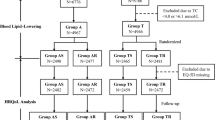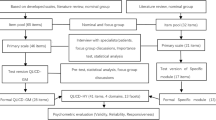Abstract
Little is known about the impact of treatment-resistant hypertension (TRH) on health-related quality of life (HrQoL). We aimed to compare HrQoL measures in adults with apparent TRH (aTRH) and non-resistant hypertension among nationally representative US Medical Expenditure Panel Survey data pooled from 2000 to 2011. Cohorts compared were adults with aTRH (⩾2 unique fills from ⩾4 antihypertensive classes during a year) versus non-resistant hypertension (those with hypertension not meeting the aTRH definition). Key outcomes were cohort differences in SF-12v2 physical component summary (PCS) and mental component summary (MCS) scores and disease-state utility using the SF-6D. Of 57 150 adults with hypertension, 2501 (4.4%) met criteria for aTRH. Persons with aTRH, compared with non-resistant hypertension, were older (mean, 68 vs 61 years), had a higher BMI (30.9 vs 29.7 kg m−2) and were more likely to be Black (20% vs 14%), but less likely to be female (46% vs 54%). Persons with aTRH, compared with non-resistant hypertension, had lower mean PCS scores (35.8 vs 43.2; P<0.0001), and utility (0.68 vs 0.74; P<0.0001), but similar MCS scores (49.1 vs 50.4). In multivariable-adjusted analyses, aTRH was associated with a 2.37 (95% CI 1.71 to 3.02) lower PCS score and 0.02 (95% CI 0.01 to 0.03) lower utility, compared with non-resistant hypertension. In conclusion, aTRH was associated with substantially lower HrQoL in physical functioning and health utility, but not in mental functioning, compared with non-resistant hypertension. The multivariable-adjusted reduction in physical functioning was similar in magnitude to previous observations comparing hypertension with no hypertension.
This is a preview of subscription content, access via your institution
Access options
Subscribe to this journal
Receive 12 digital issues and online access to articles
$119.00 per year
only $9.92 per issue
Buy this article
- Purchase on Springer Link
- Instant access to full article PDF
Prices may be subject to local taxes which are calculated during checkout


Similar content being viewed by others
References
Kearney PM, Whelton M, Reynolds K, Muntner P, Whelton PK, He J . Global burden of hypertension: analysis of worldwide data. Lancet 2005; 365 (9455): 217–223.
Lim SS, Vos T, Flaxman AD, Danaei G, Shibuya K, Adair-Rohani H et al. A comparative risk assessment of burden of disease and injury attributable to 67 risk factors and risk factor clusters in 21 regions, 1990-2010: a systematic analysis for the Global Burden of Disease Study 2010. Lancet 2012; 380 (9859): 2224–2260.
Egan BM, Zhao Y, Axon RN, Brzezinski WA . Ferdinand KC. Uncontrolled and apparent treatment resistant hypertension in the United States, 1988 to 2008. Circulation 2011; 124 (9): 1046–1058.
Pierdomenico SD, Lapenna D, Bucci A, Di Tommaso R, Di Mascio R, Manente BM et al. Cardiovascular outcome in treated hypertensive patients with responder, masked, false resistant, and true resistant hypertension. Am J Hypertens 2005; 18 (11): 1422–1428.
Kumbhani DJ, Steg PG, Cannon CP, Eagle KA, Smith SC Jr, Crowley K et al. Resistant hypertension: a frequent and ominous finding among hypertensive patients with atherothrombosis. Eur Heart J 2013; 34 (16): 1204–1214.
De Nicola L, Gabbai FB, Agarwal R, Chiodini P, Borrelli S, Bellizzi V et al. Prevalence and prognostic role of resistant hypertension in chronic kidney disease patients. J Am Coll Cardiol 2013; 61 (24): 2461–2467.
Smith SM, Gong Y, Handberg E, Messerli FH, Bakris GL, Ahmed A et al. Predictors and outcomes of resistant hypertension among patients with coronary artery disease and hypertension. J Hypertens 2014; 32 (3): 635–643.
Smith SM, Huo T, Delia Johnson B, Bittner V, Kelsey SF, Vido Thompson D et al. Cardiovascular and mortality risk of apparent resistant hypertension in women with suspected myocardial ischemia: a report from the NHLBI-sponsored WISE Study. J Am Heart Assoc 2014; 3 (1): e000660.
Daugherty SL, Powers JD, Magid DJ, Tavel HM, Masoudi FA, Margolis KL et al. Incidence and prognosis of resistant hypertension in hypertensive patients. Circulation 2012; 125 (13): 1635–1642.
Bangalore S, Fayyad R, Laskey R, Demicco DA, Deedwania P, Kostis JB et al. Prevalence, predictors, and outcomes in treatment-resistant hypertension in patients with coronary disease. Am J Med 2014; 127 (1): 71–81.
Irvin MR, Booth JN 3rd, Shimbo D, Lackland DT, Oparil S, Howard G et al. Apparent treatment-resistant hypertension and risk for stroke, coronary heart disease and all-cause mortality. J Am Soc Hypertens 2014; 8 (6): 405–413.
Trevisol DJ, Moreira LB, Kerkhoff A, Fuchs SC, Fuchs FD . Health-related quality of life and hypertension: a systematic review and meta-analysis of observational studies. J Hypertens 2011; 29: 179–188.
Vemulapalli S, Ard J, Bakris GL, Bhatt DL, Brown AS, Cushman WC et al. Proceedings from duke resistant hypertension think tank. Am Heart J 2014; 167 (6): 775–788.
Rumsfeld JS, Alexander KP, Goff DC Jr, Graham MM, Ho PM, Masoudi FA et al. Cardiovascular health: the importance of measuring patient-reported health status: a scientific statement from the American Heart Association. Circulation 2013; 127 (22): 2233–2249.
Ware JE, Kosinski M, Keller SD . A 12-item short-form health survey: Construction of scales and preliminary tests of reliability and validity. Med Care 1996; 34: 220–233.
Brazier JE, Roberts J . The estimation of a preference-based measure of health from the SF-12. Med Care 2004; 42: 851–859.
Norman GR, Sloan JA, Wyrwich KW . Interpretation of changes in health-related quality of life: the remarkable universality of half a standard deviation. Med Care 2003; 41 (5): 582–592.
Poljicanin T, Ajdukovic D, Sekerija M, Pibernik-Okanovic M, Metelko Z, Vuletic Mavrinac G . Diabetes mellitus and hypertension have comparable adverse effects on health-related quality of life. BMC Public Health 2010; 10: 12.
Stewart AL, Greenfield S, Hays RD, Wells K, Rogers WH, Berry SD et al. Functional status and well-being of patients with chronic conditions. Results from the Medical Outcomes Study. JAMA 1989; 262 (7): 907–913.
Calhoun DA, Jones D, Textor S, Goff DC, Murphy TP, Toto RD et al. Resistant hypertension: diagnosis, evaluation, and treatment: a scientific statement from the American Heart Association Professional Education Committee of the Council for High Blood Pressure Research. Circulation 2008; 117 (25): e510–e526.
Trevisol DJ, Moreira LB, Fuchs FD, Fuchs SC . Health-related quality of life is worse in individuals with hypertension under drug treatment: results of population-based study. J Hum Hypertens 2012; 26: 374–380.
Korhonen PE, Kivelä SL, Kautiainen H, Jarvenpaa S, Kantola I . Health-related quality of life and awareness of hypertension. J Hypertens 2011; 29: 2070–2074.
Li W, Liu L, Puente JG, Li Y, Jiang X, Jin S et al. Hypertension and health-related quality of life: An epidemiological study in patients attending hospital clinics in China. J Hypertens 2005; 23: 1667–1676.
Mena-Martin FJ, Martin-Escudero JC, Simal-Blanco F, Carretero-Ares JL, Arzua-Mouronte D, Herreros-Fernandez V . Health-related quality of life of subjects with known and unknown hypertension: results from the population-based Hortega study. J Hypertens 2003; 21: 1283–1289.
Banegas JR, Guallar-Castillon P, Rodriguez-Artalejo F, Graciani A, Lopez-Garcia E, Ruilope LM . Association between awareness, treatment, and control of hypertension and quality of life among older adults in Spain. Am J Hypertens 2006; 19: 686–693.
Lambert GW, Hering D, Esler MD, Marusic P, Lambert EA, Tanamas SK et al. Health-related quality of life after renal denervation in patients with treatment-resistant hypertension. Hypertension 2012; 60 (6): 1479–1484.
Gong Y, Handberg EM, Gerhard T, Cooper-DeHoff RM, Ried LD, Johnson JA et al. Systolic blood pressure and subjective well-being in patients with coronary artery disease. Clin Cardiol 2009; 32 (11): 627–632.
Bhatt DL, Kandzari DE, O'Neill WW, D’Agostino R, Flack JM, Katzen BT et al. A controlled trial of renal denervation for resistant hypertension. N Engl J Med 2014; 370: 1393–1401.
Hays RD, Reeve BB, Smith AW, Clauser SB . Associations of cancer and other chronic medical conditions with SF-6D preference-based scores in Medicare beneficiaries. Qual Life Res 2014; 23: 385–391.
Walters SJ, Brazier JE . What is the relationship between the minimally important difference and health state utility values? The case of the SF-6D. Health Qual Life Outcomes 2003; 1: 4.
Hanmer J, Lawrence WF, Anderson JP, Kaplan RM, Fryback DG . Report of nationally representative values for the noninstitutionalized US adult population for 7 health-related quality-of-life scores. Med Decis Making 2006; 26 (4): 391–400.
Sullivan PW, Ghushchyan V . Preference-based EQ-5D index scores for chronic conditions in the United States. Med Dec Making 2006; 26: 410–420.
Smith SM . Epidemiology, prognosis, and treatment of resistant hypertension. Pharmacotherapy 2013; 33 (10): 1071–1086.
Author information
Authors and Affiliations
Corresponding author
Ethics declarations
Competing interests
The authors declare no conflict of interest.
Rights and permissions
About this article
Cite this article
Carris, N., Ghushchyan, V., Libby, A. et al. Health-related quality of life in persons with apparent treatment-resistant hypertension on at least four antihypertensives. J Hum Hypertens 30, 191–196 (2016). https://doi.org/10.1038/jhh.2015.61
Received:
Revised:
Accepted:
Published:
Issue Date:
DOI: https://doi.org/10.1038/jhh.2015.61
This article is cited by
-
Resistant Hypertension: Mechanisms and Treatment
Current Hypertension Reports (2017)
-
Quality of Life in Treatment-Resistant Hypertension
Current Hypertension Reports (2015)



